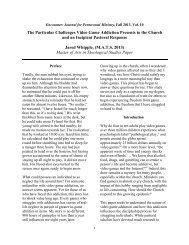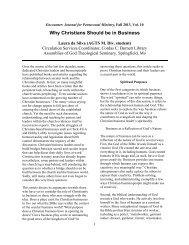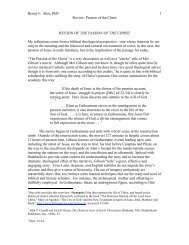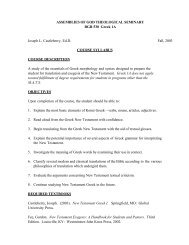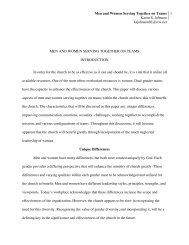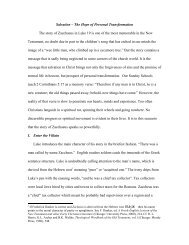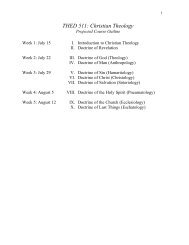Encounter: Journal for Pentecostal Ministry - Assemblies of God ...
Encounter: Journal for Pentecostal Ministry - Assemblies of God ...
Encounter: Journal for Pentecostal Ministry - Assemblies of God ...
You also want an ePaper? Increase the reach of your titles
YUMPU automatically turns print PDFs into web optimized ePapers that Google loves.
necessary, and limited agent to provide <strong>for</strong><br />
the common good, but it functions best in<br />
partnership with associations that are close to<br />
the people and best able to meet their<br />
particular needs.” 26<br />
Jane E. Grant’s New American Social<br />
Compact 27<br />
In The New American Social Compact:<br />
Rights and Responsibilities in the 21st<br />
Century, Jane E. Grant examines the history<br />
<strong>of</strong> the American social compact. This goes<br />
beyond contract theories developed in the<br />
seventeenth and eighteenth centuries that set<br />
<strong>for</strong>th a set <strong>of</strong> civil liberties and political<br />
rights, and later in the nineteenth century<br />
expand to a set <strong>of</strong> social rights. 28 The<br />
compact expands these rights to include a<br />
civic ethos. The civic ethos involves creating<br />
a climate <strong>of</strong> interchange where the rights can<br />
be either supported or contested as well as<br />
the obligations that flow from them. 29 Such<br />
obligations, as Grant sets out, “could include<br />
responsibilities to others in one‟s own nation,<br />
to future generations, to other nations and<br />
their citizens, to stateless individuals, and to<br />
other species and the biosphere.” 30 This new<br />
compact and civic procedural ethos will<br />
honor the civil, political, and social rights<br />
already established in the United States<br />
(procedural republic). It would go further,<br />
however, in defining the particular<br />
responsibilities and obligations <strong>of</strong> citizens. 31<br />
In recent years a shift in the opposite<br />
direction has taken place in government<br />
where an emphasis on authorization has<br />
supplanted that <strong>of</strong> accountability as people<br />
vote on personal characteristics more than<br />
ability to govern. 32 With such a shift no one<br />
should be surprised—appalled yes, but not<br />
surprised—to see a leader more influenced<br />
by Niccolo Machiavelli and Thomas Hobbes<br />
than Thomas Jefferson and James Madison. 33<br />
Grant talks about many issues <strong>of</strong> the new<br />
compact, but I will focus primarily on the<br />
concept <strong>of</strong> democratic deliberation. Kurt<br />
Richardson speaks <strong>of</strong> “democratic learning”<br />
in his “Political Complexities and Rivalries<br />
<strong>of</strong> Pneuma and Imperia,” but this seems to<br />
end <strong>for</strong> him once the basic competencies<br />
required <strong>of</strong> an active citizen in a democracy<br />
are established. 34 As Richardson notes,<br />
Christian pneumatology points to an<br />
inherently egalitarian anthropology, pivotal<br />
<strong>for</strong> a new social compact and proper<br />
deliberation. 35<br />
However, Grant provides some examples <strong>of</strong><br />
what such deliberation might look like. One<br />
proposal involves deliberative panels in the<br />
public sphere that would provide<br />
recommendations to legislative and executive<br />
bodies in the government. 36 Of course such<br />
panels would have access to expertise in<br />
politics, science, technology, and social and<br />
economic in<strong>for</strong>mation. 37 Such panels, unlike<br />
participating in town hall meetings, may be<br />
in some <strong>for</strong>m partially obligatory, as is jury<br />
duty. The particular model, though, is not as<br />
important as the idea <strong>of</strong> public involvement.<br />
Grant works from the ideas <strong>of</strong> Arendt and<br />
Habermas, who asserted that deliberation,<br />
when executed properly, can be<br />
trans<strong>for</strong>mative because it generates proper<br />
perspective. It focuses on the common good;<br />
it provides ordinary citizens with access to<br />
the public policy agenda. Since Americans<br />
are typically unin<strong>for</strong>med about policy issues,<br />
it provides access to in<strong>for</strong>mation on complex<br />
problems. 38 Finally, Grant notices that<br />
communication and public deliberation<br />
per<strong>for</strong>med vital roles in <strong>for</strong>ming the<br />
constitutional state; likewise, communication,<br />
public discussion, and deliberation are<br />
necessary in the new compact as well. 39<br />
A Politics <strong>of</strong> Love and a “Consistent Ethic<br />
<strong>of</strong> Life” 40<br />
In the others I do not look at what is like<br />
myself, but at what is different in them,<br />
and try to understand it. I can only




